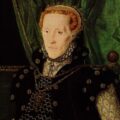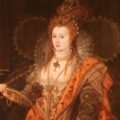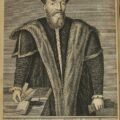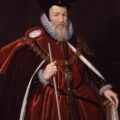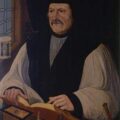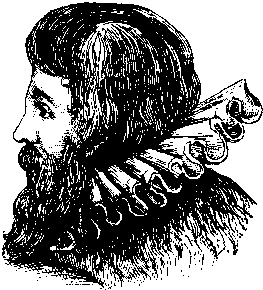
Here are some facts about this Tudor scholar and tutor:-
- He was born c1514/1515 in Kirby Wiske in the North Riding of Yorkshire
- His father was John Ascham, steward to Henry, 7th Lord Scrope of Bolton
- As a teenager he was placed in the household of Suffolk lawyer and royal commissioner Humphrey Wingfield, a man who modelled his household on that of Sir Thomas More
- He was taught Latin and Greek
- He loved archery
- In 1530 he matriculated at Cambridge University and joined St John’s College, where he met Sir John Cheke and Robert Pember, who both helped him with his Greek
- He became a questionist in autumn 1533 and then on the 18th February 1534 he was admitted BA and nominated for a fellowship
- On 3rd July 1537 he obtained his MA
- In the early 1540s his patron was Edward Lee, Archbishop of York
- In 1544 he was interviewed by Giles Arlington for the position of tutor to Thomas More’s grandchildren but he refused the post because he wanted to go abroad
- In July 1544 he was passed over for the vacant regius chair of Cambridge and also failed to win the Greek readership at St John’s for his pupil William Grindal
- In 1545 Thomas Cranmer helped him out financially after Archbishop Lee’s death left him somewhat impoverished
- He suffered with bad health throughout his life, probably due to malaria
- His work “Toxophilus” was dedicated to Henry VIII who, like Ascham, was keen on archery and who rewarded him with a royal pension
- In 1546 Ascham was elected public orator of Cambridge, a post which he held until 1554
- In 1548 Princess Elizabeth insisted that Ascham become her tutor after the death of William Grindal from the plague. According to Rosemary O’Day, Ascham “contrived a classical and Christian curriculum for the princess that was designed to equip her for a leading role in the state” and “With her he pioneered his method of teaching languages by double translation, which he was to make famous in The Scholemaster”. Her education included Greek and calligraphy
- In 1550 he served as secretary to Sir Richard Morison, ambassador to the Imperial Court, and travelled to Germany. While travelling on the Continent he was appointed as Edward VI’s Latin secretary, a post which he was also given during Mary I’s reign after his return to England
- On 1st June 1554 he married Margaret Howe, daughter of Sir Clement Harleston, after winning a court case when another suitor tried to kidnap her to stop the marriage
- He carried on tutoring Princess Elizabeth during Mary I’s reign and “as he recounted to Sturm, was amazed by her erudition, linguistic skills, and political understanding”.
- He continued as Latin secretary when Elizabeth came to the throne in 1558 and was friendly with the Queen’s favourite, Robert Dudley
- He often lived in poverty due to the large family he had to support (seven or eight children), as well as various relations
- His works include “The Scholemaster”, his famous and influential treatise on education, and “Toxophilus”, the first English book on archery.
- In “The Scholemaster” he wrote of visiting Lady Jane Grey at her home, Bradgate. He found her in her room reading Plato while the rest of the family were hunting and she allegedly told him of the ill treatment she suffered from her parents: “For when I am in presence either of father or mother, whether I spekee, kepe silence, sit, stand, or go, eate, drinke, be merie, or sad, be sowying, plaiying, dauncing, or doing anything els: I must do it, as it were, in soch weight, measure, and number, even as perfectlie as God made the world; or els I am so sharplie taunted, so cruellie threatened, yea presentlie some tymes with pinches, nippes and bobbes, and other waies I will not name for the honour I beare them, so without measure misordered, that I thinke myself in hell, till tyme cum that I must go to Mister Elmer, who teacheth me so jentlie, so pleasantlie, with soch faire allurements to lerning, that I think all the tyme nothing, whiles I am with him.”
Notes and Sources
- ‘Ascham, Roger (1514/15–1568)’, Rosemary O’Day, Oxford Dictionary of National Biography, Oxford University Press, 2004
- Lady Jane Grey, Education, Britannia.com
